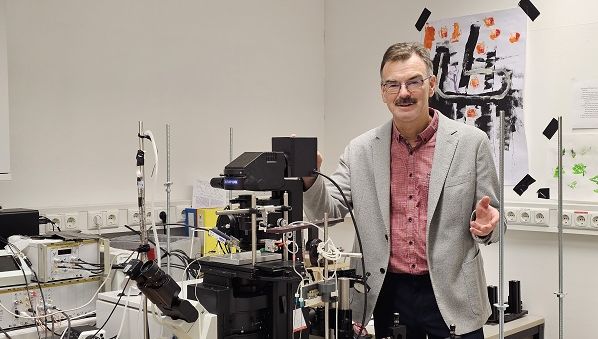FWF Funding for the “Molecular Transport and Molecule Recognition” PhD Program
€ 2.49 million in funding to support joint research at the JKU and at KUK.

Coordinated by Prof. Peter Pohl (JKU), the “Molecular Transport and Molecular Recognition” PhD program is set to launch during the 2025 Summer Semester. Prof. Pohl is thrilled with the decision and remarked: “Funding approval demonstrates continuity. Less than 20 years ago, I served as the spokesperson for one of the first doctorate degree programs (Molecular Bio-Analytics) that the Austrian Science Fund launched. Above all, however, receiving this type of funding documents the young Faculty of Medicine’s enormous research potential in Linz. As a biophysicist and physician, I am especially delighted that the partnership between the JKU Faculty of Engineering & Natural Sciences and the JKU Faculty of Medicine has now received funding.”
Insight into How the Body Works
Each cell in our body contains tiny molecular machines that perform vital functions that are indispensable in maintaining our health, such as transporting nutrients, sending signals, and waste disposal. If disrupted, we could experience disease or illness. Certain proteins, for example, facilitate the flow of calcium into nerve cells, allowing us to think and move. Other proteins impact how we respond to allergic reactions. Understanding exactly how these transport mechanisms work and how they are altered by disease or age remains a mystery.
Young scholars in the new doctorate degree program will learn how to address these fundamental questions by conducting research into these processes, ranging from individual molecules to entire organisms. In doing so, they will learn how to work with state-of-the-art microscopes and other technologies so precise, they can ultimately reveal functions otherwise invisible to the naked eye. In addition, they will develop new instruments to examine these molecules even better.
In partnership with professors in physics, chemistry, and medicine, students will acquire a new understanding of just how molecules cross cell membranes. The information can help to improve treating illnesses and better understanding how our bodies change as we age.
The program will not only prepare students to pursue their intended future career, but also foster collaborative research and educational efforts between the natural sciences and medicine. By pooling resources across two JKU faculties, the program seeks to solve the great mysteries of base-knowledge research in medicine and education the next generation of researchers.
News

 Go to JKU Homepage
Go to JKU Homepage







![FWF Logo [Translate to Englisch:] FWF-Logo](/fileadmin/_processed_/8/e/csm_fwf-logo_var2_small_380671a37b.jpg)


